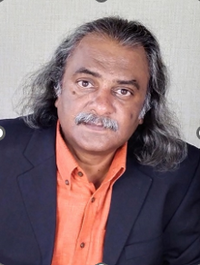Gideon Arulmani PhD,
Director, The Promise Foundation, Bangalore, India
Title of the Keynote
Rehumanising Work to Meet Contemporary, Post-Pandemic Challenges to Education, Training and Career: Time to Herald the 5th Industrial Revolution?
Abstract
At last, the masks are off, handwashing while singing the birthday song is not mandatory, we are free to travel wherever we want to or not, we can shake each other by the hand...why, we can even hug! Pandemic related lockdowns and restrictions have been lifted and we are free to return to pre-pandemic ways of living and working. A striking post-pandemic development, however, is that increasingly large numbers of people who have successfully engaged with their careers are expressing the desire to exit the 'careerist' path. People are saying that they feel trapped and exploited by their jobs, that modern work is exhausting and stressful, that jobs are abusive and unrewarding and that workplaces are toxic. A closer look indicates that while the pandemic might have been a trigger, unhappiness with work, not just the conditions of work,
Over the centuries, the codification and application of knowledge pertaining to work has progressed along two different pathways: livelihood and career. Livelihood is perhaps as old as the history of human engagement with work. By contrast, the emergence of career is a more recent, largely peri/post-industrial phenomenon. Livelihoods are located in cultural processes, while the notion of career is influenced by economic, labor market mediated forces. Careers require formal, academic (school and college) education and assume a linear and incremental progression. The transmission of livelihood related skills is less structured and spirally intertwined, enfolding apprentice and work-based learning within a framework of “livelihood thinking”. The notion of career tendencies, in a Western context, to carry connotations of personal development, Exercise of the will and choice, delineation of personal suitability, preparation, and specialization. On the other hand, livelihood goes deeper. It is not just a means to become financially secure. It is rooted in a way of living.
This presentation will examine contemporary career development from the point of view of the much older perspective of livelihood thinking. Focusing on collectivist-individualist tensions, it will pose the question: “What if livelihood thinking were to be infused into contemporary routines of career development?”. Drawing upon the cultural preparation process model (Arulmani, 2014), the presentation will describe livelihood thinking with illustrations from alternative approaches to work. The presentation will then consider how bidirectional collaborations between career development and livelihood thinking could offer guidelines to equip career guidance and counseling professionals to meet contemporary challenges of practice.
Brief Bio
Gideon Arulmani, is a clinical psychologist with an M.Phil in Medical and Social Psychology from the National Institute for Mental Health and Neuro Sciences (India) and a doctoral degree in Career Psychology from the University of Portsmouth (UK). He is the Founder and Director of The Promise Foundation, headquartered in Bangalore, India. His work on Cultural Preparedness in Career Counseling was ground breaking in our understanding of the need for a more informed approach to work with clients from different backgrounds and traditions. He also contributed a great deal to knowledge of the relationship between migration and work through his work with countries across Europe, North America and the Far East through assignments for various multilateral agencies such as the ILO, UNICEF and the World Bank.
